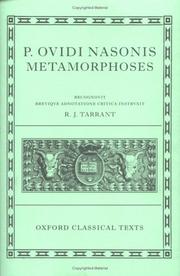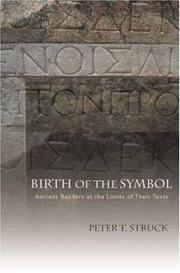| Listing 1 - 4 of 4 |
Sort by
|
Book
ISBN: 8876947620 9788876947629 Year: 2004 Volume: 2 Publisher: Alessandria: Ed. dell'Orso,
Abstract | Keywords | Export | Availability | Bookmark
 Loading...
Loading...Choose an application
- Reference Manager
- EndNote
- RefWorks (Direct export to RefWorks)
Classical poetry --- Poetry, Medieval --- History and criticism --- Congresses --- European poetry --- Medieval poetry --- Classical literature --- Classical poetry - History and criticism - Congresses --- Poetry, Medieval - History and criticism - Congresses --- Poésie --- Antiquité chrétienne --- Moyen Age

ISBN: 0198146663 9780198146667 1280846933 0191819123 0191568503 Year: 2004 Volume: *12 Publisher: Oxonii Clarendon
Abstract | Keywords | Export | Availability | Bookmark
 Loading...
Loading...Choose an application
- Reference Manager
- EndNote
- RefWorks (Direct export to RefWorks)
Mythology, Classical --- Metamorphosis --- Fables, Latin --- Mythologie ancienne --- Métamorphose --- Fables latines --- Poetry. --- Mythology --- Poésie --- Mythologie --- Ovid, --- Fables, Latin. --- Métamorphose --- Poésie --- Latin fables --- Mythologie classique --- Fables latines. --- Ovide --- Poetry --- Mythology, Classical - Poetry --- Metamorphosis - Mythology - Poetry

ISBN: 0674014804 9780674014800 Year: 2004 Volume: 14 Publisher: Cambridge ; London Harvard UP
Abstract | Keywords | Export | Availability | Bookmark
 Loading...
Loading...Choose an application
- Reference Manager
- EndNote
- RefWorks (Direct export to RefWorks)
"Angelo Poliziano (1454-1494) was one of the great scholar-poets of the Renaissance and a leading figure in the circle of Lorenzo de'Medici "il Magnifico" in Florence. His "Silvae" are poetical introductions to his courses in literature at the University of Florence, written in Latin hexameters They not only contain some of the finest Latin poetry of the Renaissance, but also afford unique insight into the poetical credo of a brilliant scholar as he considers the works of his Greek and Latin predecessors as well as of his contemporaries writing in Italian."
Neo-Latin literature --- Didactic poetry, Latin (Medieval and modern) --- Classical literature --- Mythology, Classical --- Mythologie ancienne --- Translations into English. --- History and criticism --- Poetry. --- Poésie --- Poésie --- Latin didactic poetry, Medieval and modern --- Latin poetry, Medieval and modern --- Literature, Classical --- Literature --- Literature, Ancient --- Greek literature --- Latin literature --- Didactic poetry [Latin ] (Medieval and modern) --- Translations into English --- Poetry --- Mythology [Classical ] --- Classical poetry --- Classical poetry. --- Didactic poetry, Latin (Medieval and modern). --- Mythology, Classical. --- History and criticism. --- Poliziano, Angelo, --- Sylvae (Poliziano, Angelo).

ISBN: 0691116970 0691162263 1400826098 9786612935367 9786612087431 1282935364 1282087436 9780691116976 9781400826094 Year: 2004 Publisher: Princeton, N.J.
Abstract | Keywords | Export | Availability | Bookmark
 Loading...
Loading...Choose an application
- Reference Manager
- EndNote
- RefWorks (Direct export to RefWorks)
Nearly all of us have studied poetry and been taught to look for the symbolic as well as literal meaning of the text. Is this the way the ancients saw poetry? In Birth of the Symbol, Peter Struck explores the ancient Greek literary critics and theorists who invented the idea of the poetic "symbol." The book notes that Aristotle and his followers did not discuss the use of poetic symbolism. Rather, a different group of Greek thinkers--the allegorists--were the first to develop the notion. Struck extensively revisits the work of the great allegorists, which has been underappreciated. He links their interest in symbolism to the importance of divination and magic in ancient times, and he demonstrates how important symbolism became when they thought about religion and philosophy. "They see the whole of great poetic language as deeply figurative," he writes, "with the potential always, even in the most mundane details, to be freighted with hidden messages." Birth of the Symbol offers a new understanding of the role of poetry in the life of ideas in ancient Greece. Moreover, it demonstrates a connection between the way we understand poetry and the way it was understood by important thinkers in ancient times.
Books and reading --- Classical poetry --- Rhetoric, Ancient. --- Symbolism in literature. --- History and criticism. --- Allegory. --- Poésie ancienne --- Symbolisme dans la littérature --- Livres et lecture --- Rhétorique ancienne --- Allégorie --- Histoire et critique --- History and criticism --- Symbolism in literature --- Greece --- Rome --- Rhetoric [Ancient ] --- Allegory --- Rhetoric, Ancient --- Signs and symbols in literature --- Symbolism in folk literature --- Ancient rhetoric --- Classical languages --- Greek language --- Greek rhetoric --- Latin language --- Latin rhetoric --- Appraisal of books --- Books --- Choice of books --- Evaluation of literature --- Literature --- Reading, Choice of --- Reading and books --- Reading habits --- Reading public --- Reading --- Reading interests --- Reading promotion --- Personification in literature --- Rhetoric --- Appraisal --- Evaluation
| Listing 1 - 4 of 4 |
Sort by
|

 Search
Search Feedback
Feedback About
About Help
Help News
News